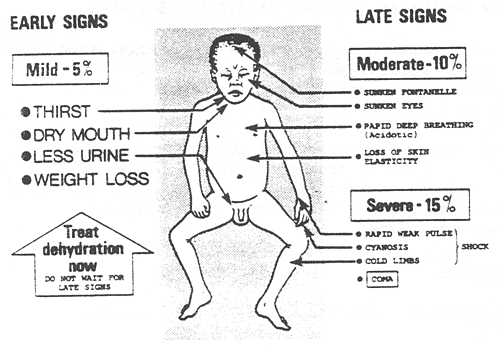A nurse in an emergency department is assessing an infant who is dehydrated. Which of the following findings should the nurse expect?
Irritability
Tetany
slow, bounding pulse
Decreased temperature
The Correct Answer is A
The nurse should expect to find irritability in an infant who is dehydrated. Dehydration in infants can lead to changes in behavior and irritability due to the imbalance in fluid and electrolytes. Other common signs of dehydration in infants may include:
Poor skin turgor (skin tenting)
Sunken fontanelles (soft spots on the baby's head)
Dry mucous membranes (dry mouth and tongue)
Decreased urine output or concentrated urine
Rapid heart rate (tachycardia)
Increased respiratory rate
Sunken eyes
Decreased tears when crying

B. Tetany is a condition characterized by involuntary muscle contractions and is more commonly associated with hypocalcemia (low calcium levels) rather than dehydration.
C. A slow, bounding pulse is not typically associated with dehydration. Dehydration often leads to a rapid heart rate (tachycardia) as the body attempts to compensate for the loss of fluid.
D. Decreased temperature is not a typical finding in dehydration. Dehydration can lead to fever in some cases due to an underlying infection, but it does not cause a decrease in body temperature on its own.
Nursing Test Bank
Naxlex Comprehensive Predictor Exams
Related Questions
Correct Answer is C
Explanation
A.Factor X is a clotting factor involved in the coagulation cascade. It is not directly related to preventing infections. While clotting factors are essential for hemostasis, they do not play a role in infection prevention.
B. Steroids can suppress the immune response, making the child more susceptible to infections. Therefore, they are not specifically administered to prevent infections
C. In a child with a sickle cell crisis who is hospitalized, preventing infections is crucial due to the increased risk of infections in this condition. Administering immunizations that the patient is scheduled for can help prevent certain infections.
Children with sickle cell disease are at a higher risk of bacterial infections, especially from encapsulated organisms like Streptococcus pneumoniae and Haemophilus influenzae. Vaccines can help protect against these pathogens and reduce the risk of serious infections.
Some of the recommended immunizations for children with sickle cell disease include:
Pneumococcal vaccine: This helps protect against infections caused by Streptococcus pneumoniae, which can cause severe respiratory and bloodstream infections.
Haemophilus influenzae type B (Hib) vaccine: This protects against infections caused by Haemophilus influenzae type B, which can lead to serious illnesses like pneumonia and meningitis.
Meningococcal vaccine: This protects against Neisseria meningitidis, which can cause meningitis and bloodstream infections.
Influenza vaccine: This annual vaccine helps protect against seasonal flu, which can be severe in children with sickle cell disease.
Administering these vaccines according to the recommended schedule helps provide protection against certain infections and can improve outcomes for children with sickle cell disease during hospitalization and beyond. The other options, Factor X, steroids, and PCA morphine, are not specific measures for preventing infections in a child with sickle cell crisis.
D.PCA (patient-controlled analgesia) morphine is used for pain management during a sickle cell crisis. It does not directly prevent infections.
Correct Answer is C
Explanation
In an infant with a history of vomiting and fever, body weight is the most reliable indicator of fluid loss. Monitoring the infant's weight over time can help assess the degree of dehydration and guide the appropriate fluid replacement therapy. A significant decrease in body weight suggests significant fluid loss.
Option A: Skin integrity is important to assess for signs of dehydration, but it is not as reliable as body weight in determining the extent of fluid loss.
Option B: Respiratory rate can be affected by various factors and is not a direct indicator of fluid loss.
Option D: Blood pressure is not the most reliable indicator of fluid loss in an infant with dehydration. In severe cases of dehydration, blood pressure can drop, but it is not as sensitive as body weight in assessing the extent of fluid loss.
Whether you are a student looking to ace your exams or a practicing nurse seeking to enhance your expertise , our nursing education contents will empower you with the confidence and competence to make a difference in the lives of patients and become a respected leader in the healthcare field.
Visit Naxlex, invest in your future and unlock endless possibilities with our unparalleled nursing education contents today
Report Wrong Answer on the Current Question
Do you disagree with the answer? If yes, what is your expected answer? Explain.
Kindly be descriptive with the issue you are facing.
